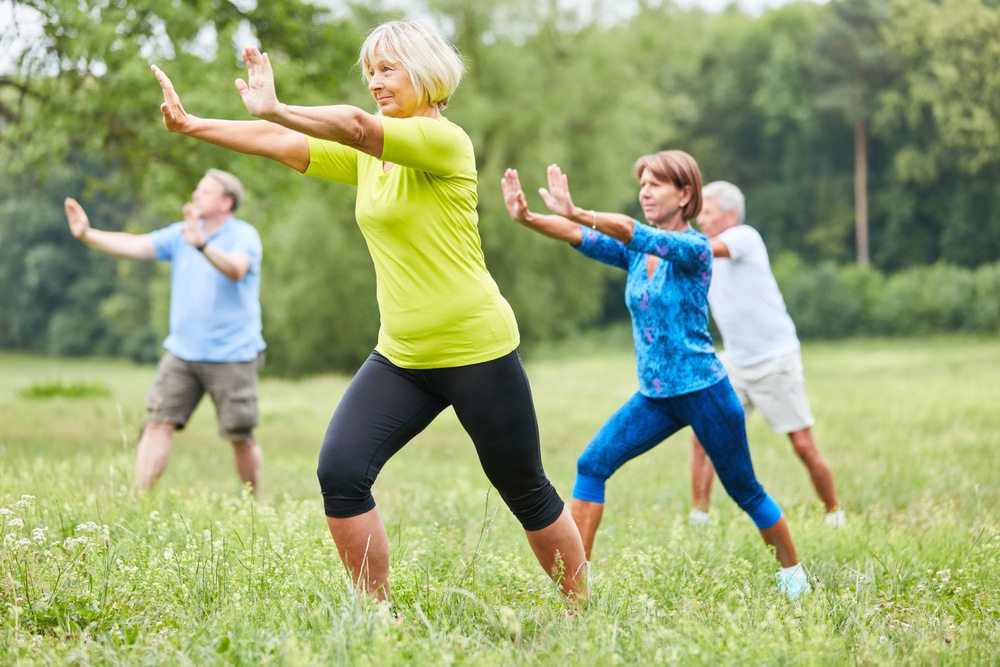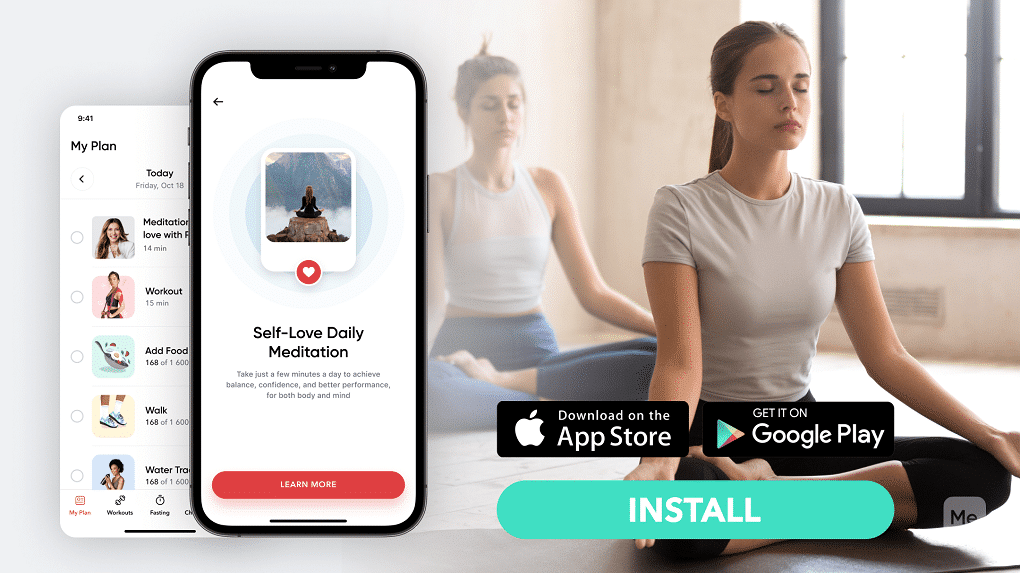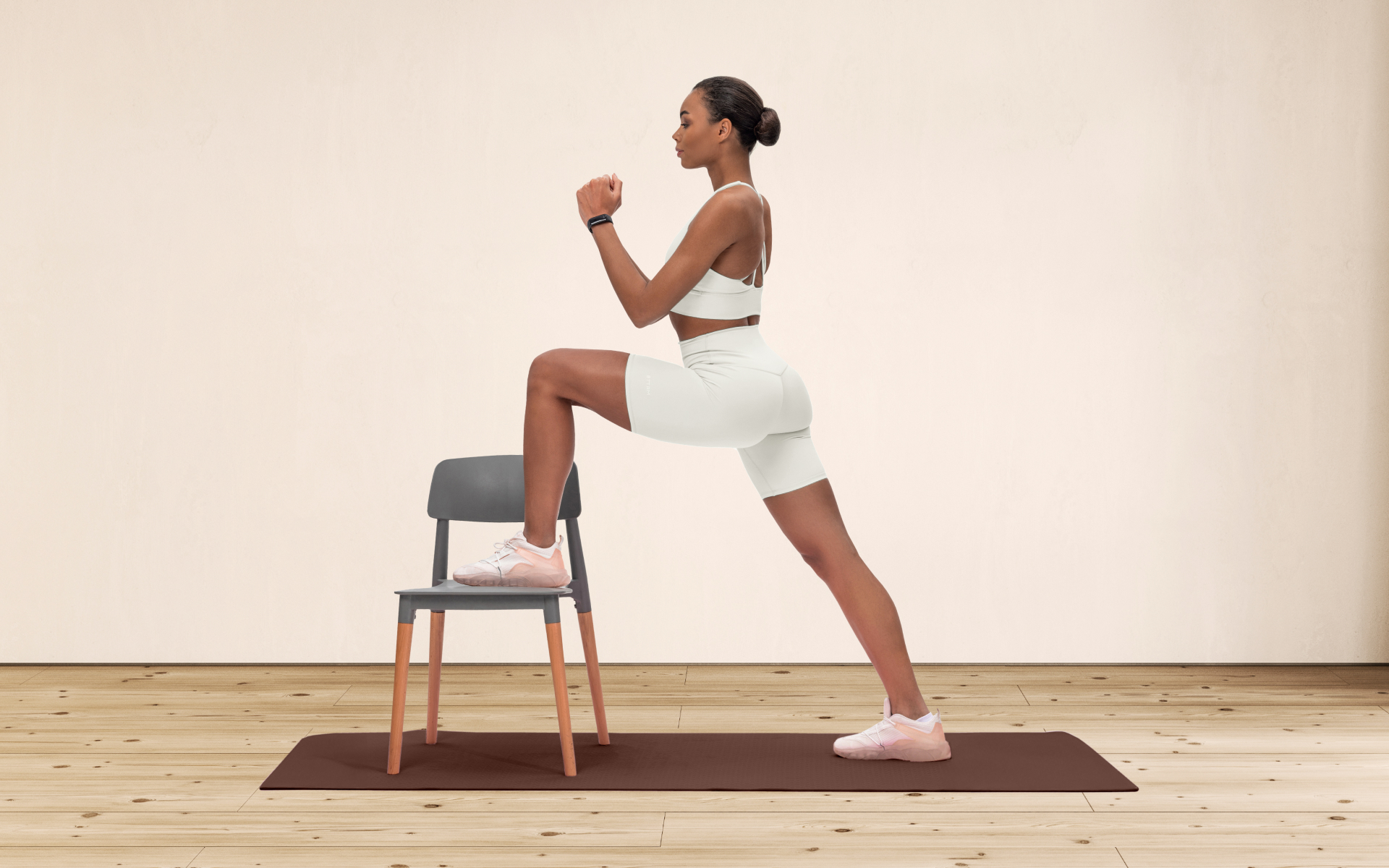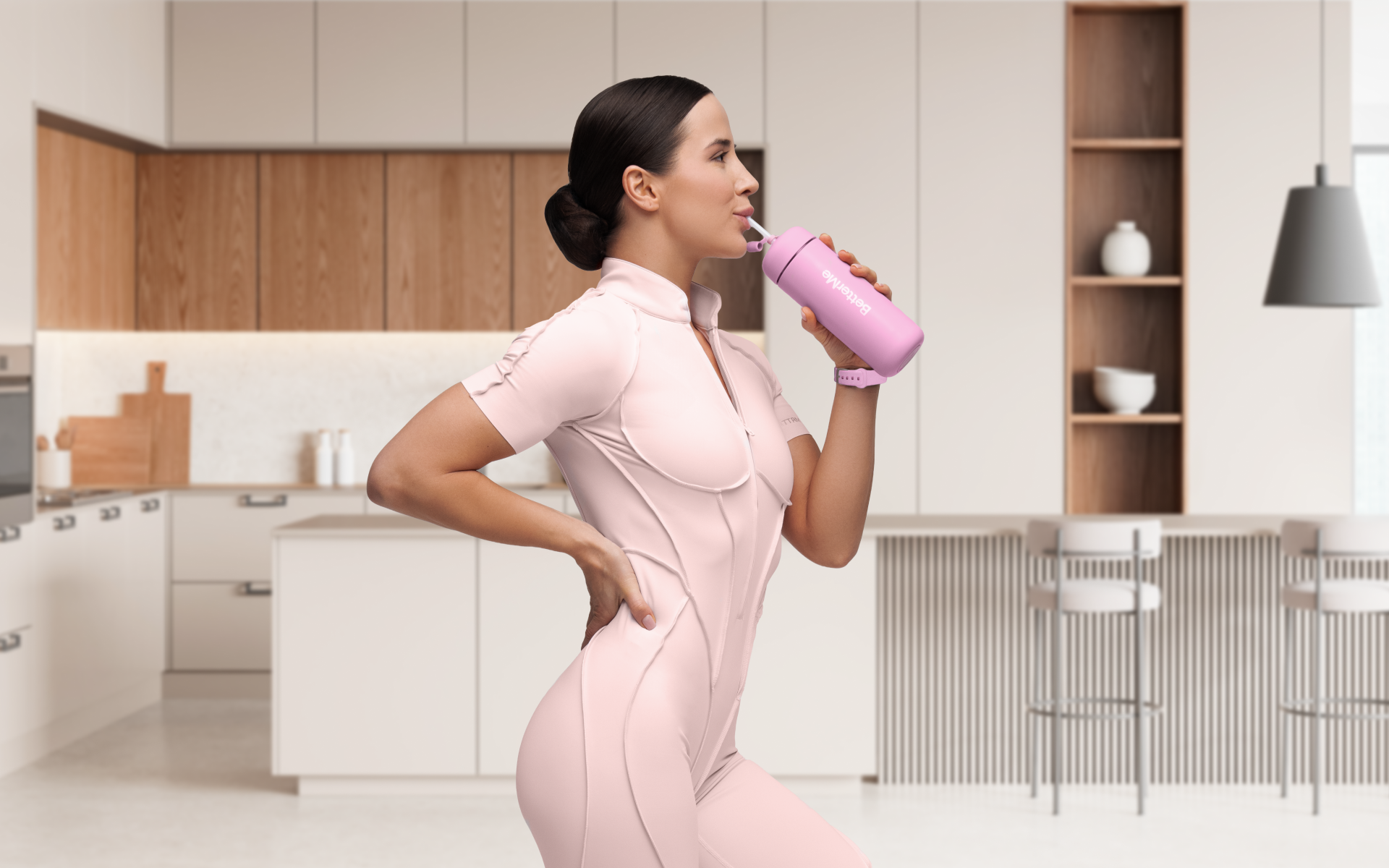The benefit of exercise for seniors is well researched—regular physical activity can help improve bone and muscular health, reduce the risk of cardiovascular disease, and improve overall mental health (6). Unfortunately, mobility issues can make it difficult for seniors to participate in traditional forms of exercise. A traditional exercise for many Asians, called Tai chi, however, is a low-impact form of exercise that can be perfect for seniors everywhere. Aside from its ease of use, tai chi encourages a mind-body connection which can be highly beneficial for seniors. Because of this connection it’s no wonder that tai chi is often referred to as “meditation in motion” (7). Here’s everything you need to know about the benefits of tai chi for seniors.
Get your personalized
meal plan!
What Exactly Is Tai Chi?
Tai chi is an ancient Chinese martial art that’s based on the principle of yin and yang—the belief that opposite forces are interconnected and interdependent (15).
Behind tai chi’s slow and graceful movements is an emphasis on one’s internal energy, or qi. Qi can be thought of as a life force that flows through the body; this qi can be augmented and controlled through breathing techniques and focused awareness.
This practice involves a series of slow, fluid movements that are designed to promote balance, flexibility, and strength. Tai chi is often described as “meditation in motion” because it encourages practitioners to improve their mind-body connection by using their breath work while they move.
What Are The Variations Of Tai Chi?
There are five different styles of tai chi, derived from the original Chen family style of the art. The difference in these variations is found in the pace and rhythm of movements as well as body posture.
The five styles of tai chi include (15):
- Chen style: the original form of tai chi, characterized by deep and circular movements.
- Yang style: known for its graceful movements that are easy to learn.
- Sun style: incorporates a series of expansive and controlled movements.
- Wu/Hao style: a traditional martial art comprising solid stances and powerful strikes.
- Wu style: known for its short and compact movements
Despite these differences, all five styles of tai chi share common themes that make the art ideal for seniors.
Read More: Tai Chi Weight Loss: Meditation In Motion To Sizzle The Extra Pounds Off
What Are The Health Benefits Of Tai Chi For Seniors?
Seniors can reap a wide range of benefits from practicing tai chi regularly, including:
Improves Balance And Stability
Muscle and joint weakness are common among seniors, which can lead to decreased balance and stability. This increased risk of falls can be mitigated by practicing tai chi regularly.
The slow, controlled movements of tai chi help to improve proprioception—the ability to sense the position of your body in space. This can help seniors maintain their balance and avoid falls.
In addition, the practice of tai chi helps to strengthen the muscles that support joints, further improving balance and stability (10).
Builds Muscle Strength
Tai chi is a weight-bearing exercise, which has been shown to help build and maintain muscle mass in seniors (16). This is particularly important for older adults, as age-related muscle loss can lead to decreased strength, mobility, and functionality.
In addition to building strength and endurance, tai chi also helps improve flexibility by loosening tight joints and improving range of motion (2).
Enhances Mental Capacity And Concentration
Cognitive decline is a common problem among seniors and can contribute to depression and anxiety (9). Regular practice of tai chi has been shown to improve memory, focus, and mental clarity by increasing the growth of new brain cells in key regions (8).
The practice encourages seniors to focus on the present and avoid distractions, leading to better concentration and mental clarity.
Helps Manage Chronic Pain
Arthritis, nerve damage, and other chronic pain conditions can make it difficult for seniors to manage daily tasks. However, regular practice of tai chi has been shown to significantly improve symptoms of chronic pain in older adults (4) (12).
When combined with breathing techniques and meditation, the movements of tai chi help to reduce stress and promote relaxation, which further helps alleviate chronic pain.
If you wish to free yourself from all the extra pounds that have been weighting you down for way too long, start using the BetterMe app and overhaul your entire life!
Promotes Deep Breathing
Tai chi promotes deep, controlled breathing, which can help improve respiratory health and reduce the risk of conditions like heart disease (3) (14). The practice also encourages seniors to improve their connection with their breath, which can help them relax and de-stress.
Triggers The Release Of Endorphins
Endorphins are chemicals naturally produced by the body that act as natural painkillers and promote feelings of happiness (18).
Regular practice of tai chi has been shown to increase levels of these feel-good hormones, making the art ideal for seniors who are dealing with chronic pain and depression (1) (11).
Promotes Faster Recovery From Illness Or Injury
After a stroke or heart attack, seniors can often struggle to regain mobility and independence. However, regular practice of tai chi has been shown to help speed recovery and increase the overall quality of life post-illness or injury (13).
By improving balance, flexibility, strength, and mental clarity, tai chi helps seniors recover more quickly from illness or injury while reducing their risk of future health problems.
Which Is Better For Seniors: Tai Chi Or Yoga?
While both tai chi and yoga offer a range of benefits for seniors, tai chi is often considered the better option for older adults. This is because the slow, controlled movements of tai chi are easier to learn and less likely to cause injury than the more strenuous poses of yoga.
In addition, tai chi is a weight-bearing exercise, which can help to build muscle and maintain bone density (16). On the other hand, yoga is typically a more gentle form of exercise that focuses more on stretching and flexibility (5).
Both exercises can be beneficial for seniors, but tai chi is often the better choice for older adults who have limited mobility or are at risk of falls.
Read More: Can Stretching Make You Taller? What Science Says About Stretching And Its Impact On Height
What Are The Disadvantages Of Tai Chi?
While tai chi is generally considered a safe and beneficial form of exercise for seniors, there are some potential downsides to consider. For example, tai chi may require a high level of concentration and could be difficult for those with dementia or other cognitive impairments.
In addition, the slow, controlled movements of tai chi may not be ideal for seniors who are looking for a more physically intense workout. And since tai chi requires significant balance and coordination, seniors with pre-existing mobility issues or injuries should only attempt it with the assistance of qualified practitioners.
Overall, the pros of tai chi outweigh the cons when it comes to promoting physical and mental health in seniors. But it is important to consult with a healthcare provider before starting any new exercise regimen, especially if you have any pre-existing conditions or mobility issues.
How Many Times A Week Should You Do Tai Chi?
There is no definitive answer to this question, as the optimal frequency of tai chi practice may vary depending on individual factors such as age, fitness level and mental acuity.
Generally speaking, it is recommended that seniors aim for at least 2-3 sessions per week to experience the full benefits of the practice.
However, if you are just starting, it is important to listen to your body and go at a pace that is comfortable for you. It is also a good idea to consult with a certified tai chi instructor before beginning this form of exercise.
How To Learn Tai Chi For Seniors?
There are several different ways to learn tai chi for seniors, including in-person classes, online tutorials, and video demonstrations. To get started, try searching for local tai chi classes in your area or looking for online resources that offer beginner-friendly tutorials.
You may also want to look for tai chi instructors who have experience working with seniors and are familiar with the unique needs and challenges of this population.
And if you can find a class or instructor that is specifically tailored for seniors, this can be a great way to learn the basics of tai chi in a supportive and welcoming environment.
Yanking yourself back in shape has never been so easy with our game-changing fitness app! Start transforming your life with BetterMe!
Safety Tips For Seniors When Beginning To Learn Tai Chi
Here are a few suggestions to keep you or your loved one safe when considering tai chi as a senior:
Get Approval From Your Doctor
As with any new form of exercise, it is important to get approval from your doctor before beginning tai chi. This is especially important for seniors who have pre-existing health conditions or mobility issues.
Find A Qualified Instructor
It is important to find an instructor who is experienced in teaching tai chi to seniors. This will help to ensure that you are learning the proper techniques and incorporating the right level of intensity into your sessions.
Start Slowly And Listen To Your Body
It is important to take things slow when beginning tai chi, especially if you have been inactive for a while. And always be mindful of any physical or mental warning signs, such as pain or dizziness, and take a break if necessary.
Warm Up And Cool Down
As with any type of exercise, it is important to warm up and cool down before and after your tai chi sessions. This will help to reduce your risk of injury and improve your overall comfort level (17).
Wear Comfortable Clothing
Tai chi is typically done in loose-fitting clothing that allows for a full range of motion. So be sure to wear something comfortable that won’t restrict your movement or inhibit your breathing.
Stay Hydrated
Be sure to drink plenty of water throughout your tai chi sessions to stay hydrated and avoid any potential side effects such as dizziness, lightheadedness, or fatigue. In addition, you may want to bring a water bottle with you and take frequent breaks if needed.
The Bottom Line
Seniors can benefit greatly from practicing tai chi regularly. Whether you are just beginning your practice or looking for ways to improve your existing routine, tai chi is an excellent choice for improving overall health and wellbeing.
DISCLAIMER:
This article is intended for general informational purposes only and does not serve to address individual circumstances. It is not a substitute for professional advice or help and should not be relied on for making any kind of decision-making. Any action taken as a direct or indirect result of the information in this article is entirely at your own risk and is your sole responsibility.
BetterMe, its content staff, and its medical advisors accept no responsibility for inaccuracies, errors, misstatements, inconsistencies, or omissions and specifically disclaim any liability, loss or risk, personal, professional or otherwise, which may be incurred as a consequence, directly or indirectly, of the use and/or application of any content.
You should always seek the advice of your physician or other qualified health provider with any questions you may have regarding a medical condition or your specific situation. Never disregard professional medical advice or delay seeking it because of BetterMe content. If you suspect or think you may have a medical emergency, call your doctor.
SOURCES:
- A Review Focused on the Psychological Effectiveness of Tai Chi on Different Populations (2017, hindawi.com)
- Effect of Tai Chi on muscle strength, physical endurance, postural balance, and flexibility: a systematic review and meta-analysis (2021, ncbi.nlm.nih.gov)
- Effects of Tai Chi on exercise capacity and health-related quality of life in patients with chronic obstructive pulmonary disease: a systematic review and meta-analysis (2014, ncbi.nlm.nih.gov)
- Exploring Tai Chi in rheumatoid arthritis: a quantitative and qualitative study (2010, biomedcentral.com)
- Exploring the therapeutic effects of yoga and its ability to increase quality of life (2011, ncbi.nlm.nih.gov)
- Health benefits of physical activity: the evidence (2006, ncbi.nlm.nih.gov)
- Meditation in motion (2018, research.va.gov)
- Regular Tai Chi Practice Is Associated With Improved Memory as Well as Structural and Functional Alterations of the Hippocampus in the Elderly (2020, frontiersin.org)
- Relationship between Depression and Cognitive Impairment among Elderly: A Cross-sectional Study (2020, ncbi.nlm.nih.gov)
- Tai Chi: What You Need To Know (2022, nccih.nih.gov)
- Tai Chi and Qigong for the Treatment and Prevention of Mental Disorders (2013, ncbi.nlm.nih.gov)
- Tai Chi for Chronic Pain Conditions: A Systematic Review and Meta-analysis of Randomized Controlled Trials (2016, ncbi.nlm.nih.gov)
- Tai Chi for improving recovery after stroke (2017, ncbi.nlm.nih.gov)
- Tai Chi Is a Promising Exercise Option for Patients With Coronary Heart Disease Declining Cardiac Rehabilitation (2017, ahajournals.org)
- Tai Ji Quan: An overview of its history, health benefits, and cultural value (2014, sciencedirect.com)
- The Effectiveness of Physical Exercise on Bone Density in Osteoporotic Patients (2018, hinddawi.com)
- The Importance of Warm Up and Cool Down Article (2020, researchgate.net)
- Understanding Endorphins and Their Importance in Pain Management (2017, ncbi.nlm.nih.gov)













